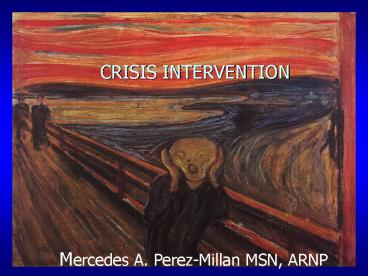CRISIS INTERVENTION - PowerPoint PPT Presentation
1 / 13
Title:
CRISIS INTERVENTION
Description:
going from Industry to Identity (passage from school age child to adolescence) TYPES OF CRISIS ... Crisis- development. Perception of event distorted ... – PowerPoint PPT presentation
Number of Views:74
Avg rating:3.0/5.0
Title: CRISIS INTERVENTION
1
CRISIS INTERVENTION
Mercedes A. Perez-Millan MSN, ARNP
2
DEFINITION A crisis is an
overwhelming reaction to a threatening
situation in which a persons usual problem
solving strategies fail to resolve the situation.
3
TYPES OF CRISIS
- Developmental (Maturational) Crisis- predicted
times of stress in everyones life which occurs
in response to a transition from one stage to
another in the life cycle. - Example- Eriksons stages going from Industry
to Identity (passage from school age child to
adolescence)
4
TYPES OF CRISIS(Continuation)
- Situational Crisis- occurs in response to a
sudden unexpected event in a persons life from
an external source. The critical life events
involves a loss or a change that threatens the
persons self esteem. For example job loss,
divorce, abortion, death of a love one, severe
physical or mental illness, etc.
5
TYPES OF CRISIS(Continuation)
- Adventitious Crisis- are not part of everyday
life. They are unplanned and accidental
resulting in traumatic experiences. Such as - Natural disasters.. hurricanes, flood, fire,
earthquake, etc - National disasters.. war, riots, etc
- Crime of violence.. Child abuse, rape, assault,
bombing in crowded areas, etc
6
CRISIS INTERVENTION GENERAL OVERVIEW
- Crisis.
- Occurs in everyone
- Not necessarily pathological, may encourage
growth and change - Time limited to a brief period, 4-6 weeks except
death - A persons perception determines the crisis
7
CRISIS INTERVENTIONBALANCING FACTORS
- Crisis- good outcome
- Perception of event realistic
- Situational support adequate
- Coping mechanism adequate
- No crisis
- Crisis- development
- Perception of event distorted
- Situational support inadequate
- Coping mechanisms inadequate
- Crisis
8
PHASES OF CRISIS
4.
3.
PERSONALITY DISORGANIZATION (CRISIS)
SEVERE ANXIETY
2.
TRIAL ERROR SOLUTIONS
1.
USUAL COPING MECHANISMS INEFFECTIVE
OR
STRESS
ANXIETY
NEW PROBLEM- SOLVING SOLUTIONS AND SUPPORT
ANXIETY
PRE-CRISIS LEVEL OF FUNCTIONING
9
CRISIS INTERVENTION
- ASSESSMENT
- Perception of event What happened that prompted
you to seek help? How are you feeling now? etc. - Coping mechanisms Suicidal? Homicidal? Plans?
What helps you feel better? etc. - Support systems With whom do you live with? Who
is available to help you? Who is most helpful?
etc - Mental status, previous history
- Identify clients strengths
- Self-assessment Nurses feelings
10
CRISIS INTERVENTION
- Nursing Diagnosis
- 1. Risk self directed violence
- 2. Chronic low self esteem
- 3. Hopelessness
- 4. Powerlessness
- 5. Severe/Panic levels of anxiety
- 6. Disturbed thought process
- 7. Sleep deprivation
- 8. See textbook for additional diagnosis
11
CRISIS INTERVENTION
- Planning and outcome identification
- 1. Assist the client in setting realistic goals
to return to the pre-crisis level of functioning - 2. Establish desired outcome criteria for the
client using the problem solving approach.
12
CRISIS INTERVENTION
- Implementation
- Assess for any suicidal/ homicidal thoughts or
plans. - Take initial steps to make the client feel safe
and lower anxiety. - Safety- intervene to prevent violence- suicide/
angry, aggressive client. - Listen attentively and encourage the client to
discuss the crisis situation. Facilitate the
verbalization of thoughts and feelings. - Creative and directive approach needed. Initially
nurse may make phone calls (arrange baby-sitters,
find shelters, contact social workers, etc.)
13
CRISIS INTERVENTION Cont
- Use problem solving approach.
- Identify needed social support (with patients
input) and mobilize the most needed first. - Identify and work to increase needed coping
skills (problem solving, relaxation,
assertiveness, job training, newborn care,
self-esteem). - Plan with patient interventions that are
acceptable to both. - Evaluate plan and instruct patient with
alternative plan if needed.































